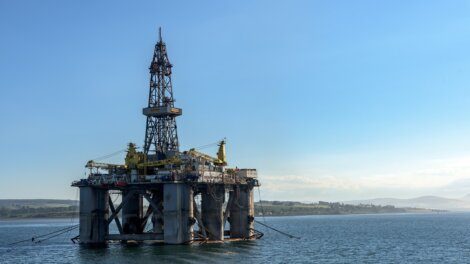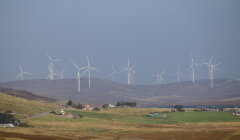Energy / New oil and gas no fix for UK’s energy security crisis, think tank says
Uplift warns that renewed focus on oil and gas production would undermine clean energy targets
RAMPING up oil and gas production in the North Sea will do nothing to improve the country’s energy security or bring rising fuel and electricity prices under control, an energy transition think tank has said.
Producing more fossil fuels from new and existing North Sea oil and gas fields is said to be one of the three key measures in the UK Government’s energy strategy which is expected to be published later this week.
The other two are massively expanding renewables including on and offshore wind, and a renewed focus on nuclear.
According to an ‘exclusive’ front page story in The Herald earlier this month, the massive Glendronach oil and gas field to the west of Shetland had already been given the go-head “in principle” as a direct response to the Russian invasion of Ukraine.
The claim could not be independently verified, despite the widely reported ambition by the government to “fast track” six North Sea oil and gas fields this year on domestic energy security grounds (Glendronach is not one of the six).
The Oil and Gas Authority did not want to comment and would only say that the complex process to bring oil and gas fields to the production stage usually takes many years, while licences are not issued “in principle”.
A spokesperson for TotalEnergies, majority owner of the field that contains around 600 million scf (standard cubic feet) of gas, meanwhile confirmed that “Glendronach continues to progress through the sanction process, which is expected to conclude in 2022”.
Become a member of Shetland News
There are however clear signs that the project will eventually happen, possibly as early as 2024, after TotalEnergies submitted a planning application for the construction of a mercury removal unit, a vital component to produce clean gas from Glendronach.
Should Glendronach come on stream, the annual rent income the council receives through the Shetland Gas Plant is likely to receive a welcome boost.
Due to the high gas price, the SIC has budgeted to receive around £1.5 million in rent income from the gas plant in 2022/23, significantly more than in previous years.
Another potential field out west is Rosebank (one of the six), owned by Norwegian oil and gas giant Equinor, and twice the size of the controversial Cambo field.
Will ramping up production achieve what is needed?
With energy prices rising rapidly since before Russia’s aggression against a sovereign country, the focus is very much on how the UK’s energy security can best be achieved, and dependencies on supply be reduced.
The extent of fuel poverty locally and nationally will reach unheard levels when electricity prices go up by an average of 54 per cent next month, with further rises already predicted for later in the year.
In addition, the cost of heating oil is reported to have more than doubled locally to almost £1.50 per litre, while petrol and diesel prices are inching nearer and nearer the £2 mark.
But will ‘ramping up’ fossil fuel production in the North Sea “to become more energy self-sufficient” (business secretary Kwasi Kwarteng) actually achieve what is needed? Or will it hinder and undermine the energy transition, and will it result in lower energy prices for the consumer?
Uplift, a climate change think tank that promotes ‘just transition’ away from fossil fuel, warns that despite the noise created by politicians and industry expanding UK oil and gas production will neither help energy security or bring down prices for consumers.
The remaining North Sea oil and gas assets are not a national resource that can be turned on at will, Uplift said, and it points out that most oil produced in the North Sea is exported.
With regards to known gas reserves, the resource is far too small to make any meaningful contribution towards reducing the UK’s dependency on imports.
They are also not owned by UK companies and there are no guarantees that UK customers will benefit from additional fossil fuel production in the North Sea.
A briefing paper circulated by Uplift earlier this month reads: “Of the six named fields, only three would primarily produce gas. The rest are oil fields (and the UK exports most of its oil).
“Together these fields would only produce enough gas to satisfy about two per cent of the UK’s total demand or, put another way, they would allow us to cut the amount of gas current import by four per cent.
“Gas production from these fields, however, would only start in 2026-7 at the earliest, so in four years time, and after five years of marginally reduced imports most of it would be gone.
“And all the time, this gas would be sold to us at the market price, which could remain unaffordably high. New fields, fast-tracked or not, are no fix for the UK’s energy security.”
It adds that the recently approved Abigail oil and gas field to the east of Scotland will produce enough gas to meet the UK’s demand for a mere 34 hours, while the field’s oil is likely to be exported.
Investment decision by operators in the North Sea are driven by oil and gas profits, not ensuring that the UK has an affordable supply of energy, the think tank said.
Most oil and gas producers invest nothing in UK renewable energy production, Uplift said, and it lamented that too little was done on cutting emissions from burning oil and gas.
“More than that, continued North Sea expansion is acting as a brake on UK’s future ambitions for cheaper, cleaner and more secure energy system,” it said.
“Continued North Sea exploration and production cannot and will not solve the crisis facing the UK, which is one of affordability. Worse, it is contributing to irreversible climate change.”
Become a member of Shetland News
Shetland News is asking its many readers to consider paying for membership to get additional features and services: -
- Remove non-local ads;
- Bookmark posts to read later;
- Exclusive curated weekly newsletter;
- Hide membership messages;
- Comments open for discussion.
If you appreciate what we do and feel strongly about impartial local journalism, then please become a member of Shetland News by either making a single payment, or setting up a monthly, quarterly or yearly subscription.

















































































